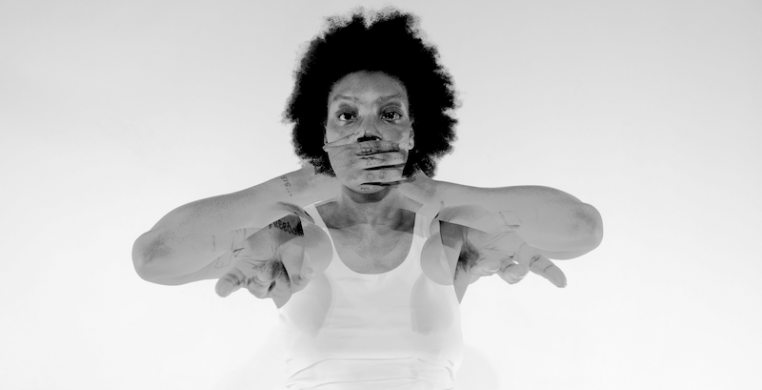Much will be said about Jenn Freeman (A.K.A. Po’Chop) and her latest works, “Litany” and “The Brown Pages.” Paying homage to humble praise dance beginnings and dipped in the brilliance of burlesque, Freeman delivers a two-part, multi-disciplinary experience through the mediums of dance on film and a digital "blogzine." Freeman, a master in the art of seduction, delays gratification with titrated film releases over the course of the fall. The digital release of “The Brown Pages” and an online discussion about companion piece “Litany” take place Thursday as part of the Dance Center of Columbia College fall series, "Dance Buffet."
Po’Chop moves with intention and intuition. She’s here to remind us that Black and brown are not monoliths, to pay homage to our foremothers, to uplift queer identities, to stop running away from ourselves, to trust the process and to fully embrace our multitudes. It is clear she is not just here for our enjoyment; she is also here for our empowerment and has been, from the jump.
“Litany (a call and response prayer)” is a five-part dance film; the title is inspired by Audre Lorde’s poem, “A Litany for Survival.” Created in partnership with Freeman’s longtime friend, cinematographer/director Jordan Phelps, part three of Litany, titled “Collage,” is the latest film to be released.
Expect to go on a visually stunning ride enriched with photography, videos, memes, animation, drawings, source material, context and enlightenment.
”Collage” is an androgynous ode to our multitudes, with Freeman volleying in and out of black and white anatomical postures to the erotic sounds of Serena Williams’ tennis serves. In an interview, Freeman shared she has always found Serena’s matches intriguing. “Her grunts come from that raw, involuntary place—her deepest intuition,” Freeman said.
“Litany” is a constant meditation on this “place of knowing,” as Freeman makes wardrobe, movement and location choices based on her gut, inspiring us to get reacquainted with ours. Further inspiration comes from a Lorde essay: “Uses of the Erotic, the Erotic as Power.”
In the essay, Lorde, a 20th century Black, queer, feminist writer and activist, states, “The very word erotic comes from the Greek word eros, the personification of love in all its aspects—born of Chaos, and personifying creative power and harmony. When I speak of the erotic, then, I speak of it as an assertion of the lifeforce of women; of that creative energy empowered, the knowledge and use of which we are now reclaiming in our language, our history, our dancing, our loving, our work, our lives.”
Freeman and Phelps created “Litany” during the height of the summer’s civil unrest and the ongoing pandemic.
“I feel conflicted,” Freeman said. “On the one hand I understand people’s need to pull away from the internet and take care of themselves, and on the other hand I’m saying, ‘Hey, come support my new digital release.’ I don't want this to feel like it's about me, especially during this time, because it's not.”
From click to scroll, each of the released editions of “The Brown Pages” reminds readers that we are always a part of a collective.
Stemming from Freeman’s longtime fascination with brown paper and burlap, “The Brown Pages” function as an eco-friendly, underground world of their own, paying homage to working class people in an endless library of liberation, uplifting unsung Black women through poetry, video, photography and text. Influenced in part by the women in Mariam Kaba and Essence McDowell’s book, “Lifting As they Climbed,” Freeman draws from the story of cartoonist and columnist Zelda Jackie Ormes in the initial dance film, “Torchy’s Togs," released Aug. 19.
On the same day, 70 years ago, the “Torchy’s Togs” fashion column premiered in print. In “The Brown Pages,” we learn that pioneering Ormes was the first woman and Black woman with a syndicated cartoon in America. She was also the creator of America’s first Black doll, Patty Jo.
“I was specifically inspired by women whose lives and work were intertwined,” Freeman replied when asked about her connection to Ormes. In Freeman’s “Torchy’s Togs,” she wiggles and plays with her audience in barely-there, cocoa-colored undergarments, peek-a-booing around larger-than-life, brown paper cut out dresses with sweetheart necklines. Further enchanted by Phelps’ convincing sound effects of cutting brown paper and the running of hands across a slew of brown bags, viewers are taken on a visual voyage they can almost taste.
Similar to Ormes’ comic strip character Torchy, Freeman’s performance gives the illusion that the subject matter is light, but you know it’s heavy. It reminds me of the warmth of brown but also of the chill of America’s wicked caste systems, with its brown paper bag tests and runaway slave Addie dolls from the American Girl store I couldn’t relate to, or afford.
Freeman continues this textural exploration and scholarly scrapbook pattern online with “The Brown Pages,” fleshing out her own creative process and aligning them with the nuanced lives of ancestral North Stars like her Auntie Lisa Blackman, Ormes, Lorde, Nina Simone and Elder Lucy Smith. It is clear that “The Brown Pages” are not just a visually pleasing way to “say her name.” They are here to resurrect her spirit.
“The Brown Pages” are a journal of gratitude to the creative process, a gentle whisper of, “Come on, girl,” when we question our personal and united power, paying homage to our queens and their mosaic lives.
So, what does Freeman hope we take away from this experience with “Litany” and “The Brown Pages?”
“I want folks to unearth their deepest shadows and unlock those areas of themselves that they are unaware of. I hope this work encourages their dormant parts to come alive.”
--
The digital debut of "The Brown Pages" and release of a new part of "Litany" take place Thursday, 7 p.m. A $20 donation to the Dance Center provides access to all "dessert" items on the fall series menu. For tickets or more information, click the event page below.

